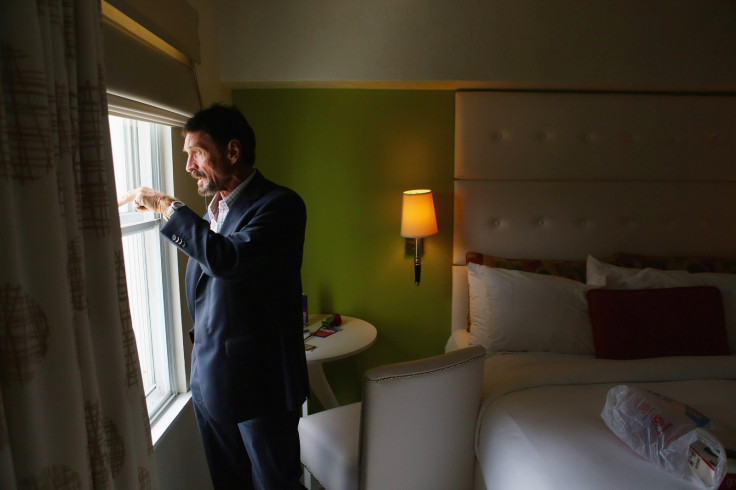John McAfee on personal privacy: 'Everybody has something to hide – the question is from whom'
John McAfee speaks to IBTimes UK about how anti-intrusion is vital to society.

When Edward Snowden exposed the spying apparatus used by intelligence agencies including the NSA and GCHQ in 2013, it changed how many people viewed personal privacy. Phone calls, web records and social-media feeds were being recorded in bulk. It seemed like nothing was off-limits.
For some law-abiding citizens, the initial reaction may have been 'I have nothing to hide'. This, according to John McAfee, technology pioneer and libertarian US presidential candidate, is not only a blatant lie but, if true, would be dangerous to the fabric of society as we know it.
"We all have a veil of privacy," McAfee told IBTimes UK in an interview during the Blockchain: Money conference on 7 November, where he was giving a keynote presentation.
"With your close friend you might divulge a number of things, with your spouse you might decide to divulge everything. But you may still choose to not tell your parents, even if you're 30 years old, that you're now smoking weed or shooting up heroin.
"So, we have layers of privacy, and it is these layers that allow our society to function. I promise you – if everybody knew everything about everybody, we would have riots in the street – beginning with a rash of spouse shootings and murders."
Given his libertarian credentials, it's perhaps unsurprising McAfee holds a strong stance when it comes to government. In one article published while running for the White House, he labelled the establishment "fundamentally broken" and said that its "status-quo mentality" should be torn down.
And speaking to him in person, he echoes the sentiment, albeit in a more nuanced way. "I don't think governments or anyone has the right to invade anybody's privacy because it is the fundamental rock upon which a rational, smoothly functioning and polite society is built," he said.
"You take privacy away and I promise you – all three of those things will disappear. I'm gonna find out you're a supporter of Isis or you're sleeping with my daughter. We keep these things secret for a reason. We are not perfect and should not be expected to be perfect."
McAfee listed a number of clear scenarios where privacy concerns are brought into question – from a person who holds anti-Muslim views living next-door to someone of the Muslim faith, to a person cheating on their tax returns, to a corporate employee padding their expenses.
"If you can find somebody who hasn't done one of those things then I'll eat my shoe, because we are all human with the same human frailties," he said.
"So, when the government starts saying 'We want to know everything about you', what is the risk?" he said. "If the government knows everything about you then a hacker will know everything about you. Ultimately, if you do not pay the ransom or the fee, it's going to be on the internet and your life is going to be ruined. We see that all the time."
It's this focus on security that McAfee always comes back to. And with the past two years hosting some of the biggest data breaches in history – from the Panama Papers to LinkedIn to Dropbox – millions of people have been affected by leaks of personal data – even the those with, as he would say, "nothing to hide".
While not involving government, the dangers of private information spilling over into dangerous territory has never been clearer in the hacks of dating websites such as AdultFriendFinder or Ashley Madison. Often, especially in the case of the latter, the outcome is much more than simple embarrassment – its resignations, its damaged reputations, its suicides.
"It has nothing to do with 'nothing to hide'," McAfee said. "Everybody has something to hide. The question is from whom, and what is it?"
© Copyright IBTimes 2024. All rights reserved.






